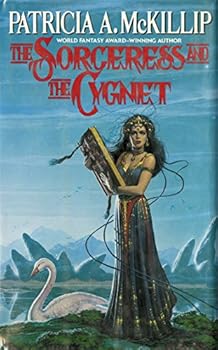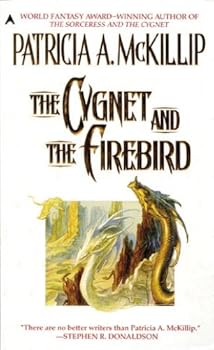She walks the path of time toward this house…
Two Patricia McKillip books in a single volume, what could be better?
As two of her earliest works, the CYGNET duology (composed of The Sorceress and the Cygnet and The Cygnet and the Firebird) make for more challenging reads than her later offerings. McKillip is renowned for her complex writing techniques. It’s obvious to those who are familiar with her distinctive poetic-prose that she’s still getting the hang of it here, and sometimes the density of it threatens to overwhelm her story. At the risk of making them sound like a chore, McKillip’s earliest books — this duology and THE RIDDLE-MASTER OF HED trilogy in particular — are not easy to read. Every word demands your utmost attention just to understand what’s going on, there is virtually no exposition to explain what’s happening, characters are dropped fully-formed into the narrative without preamble, and the plot itself is composed of and built on rich symbolism, metaphors and descriptive prose.
 But once you’ve got the gist of it (or even if you don’t) it all adds up to a unique reading experience. McKillip’s fantasy novels are special because they veer away from the usual “epic fantasy” tropes, and are simply interested in telling a relatively straightforward story in an unusual way. Most of her books are based on fairy tales with a few spins of her own, but you don’t have to track down several volumes in order to get a complete story; she epitomizes the idea that novels don’t have to be large doorstoppers in order to have depth and substance. Nearly all of her books are self-contained, and even here, the two separate stories that make up this duology are only tangentially connected to one another.
But once you’ve got the gist of it (or even if you don’t) it all adds up to a unique reading experience. McKillip’s fantasy novels are special because they veer away from the usual “epic fantasy” tropes, and are simply interested in telling a relatively straightforward story in an unusual way. Most of her books are based on fairy tales with a few spins of her own, but you don’t have to track down several volumes in order to get a complete story; she epitomizes the idea that novels don’t have to be large doorstoppers in order to have depth and substance. Nearly all of her books are self-contained, and even here, the two separate stories that make up this duology are only tangentially connected to one another.
The Sorceress and the Cygnet initially revolves around a travelling man called Corleu, who is coerced by a powerful entity into fetching a mysterious treasure in order to free his people (and his love) from eternal imprisonment. As this is a world in which the gods embody the constellations in the sky, as well as holding sovereignty over various countries (or “holdings”), Corleu is forced into a dangerous treasure hunt as he seeks out each earthly incarnation of the constellations (the Gold King, the Blind Lady, the Blood Fox) to gather the clues he needs to reach his ultimate goal.
His search eventually leads him to a swamp, where a sorceress called Nyx Ro offers her help in exchange for the treasure that he searches for. Around this point (halfway through the book), the story switches its point of view to that of Meguet Vervaine, a Guardian of Ro Holding and cousin to Nyx. With that, the structure of the treasure-hunt becomes informed by the family politics of those that rule over Ro Holding. With the family stronghold being invaded by strangers with mysterious powers, more people are drawn into the search for the elusive Cygnet’s heart.
 The Cygnet and the Firebird leaves Corleu behind in order to focus on Nyx Ro and Meguet Vervaine as its protagonists, each chapter alternating between them as they cope with the sudden appearance of a Firebird in their midst. As Nyx tries to unravel the enigma of the bird that changes into a man by moonlight, with little memory of who he is or what’s happened to him, Meguet is spirited away by a sorcerer into the barren but beautiful desert of Luxor. Clearly both men are connected in some way, but how? As the two cousins try to make their way back to each other, they begin to uncover the secrets of this strange country, discovering a terrible threat to their homeland on the way…
The Cygnet and the Firebird leaves Corleu behind in order to focus on Nyx Ro and Meguet Vervaine as its protagonists, each chapter alternating between them as they cope with the sudden appearance of a Firebird in their midst. As Nyx tries to unravel the enigma of the bird that changes into a man by moonlight, with little memory of who he is or what’s happened to him, Meguet is spirited away by a sorcerer into the barren but beautiful desert of Luxor. Clearly both men are connected in some way, but how? As the two cousins try to make their way back to each other, they begin to uncover the secrets of this strange country, discovering a terrible threat to their homeland on the way…
It’s wonderful that these two novels have not only been reprinted, but brought together in a single volume. Though the two stories have no real connection to one another beyond the reappearance of several characters, the formation of this world and how it works is explored more fully in The Sorceress and the Cygnet, making it all-but-essential reading for its sequel.
The story may start with Corleu, but it ends with Meguet and Nyx, the women of Ro Holding. Beyond McKillip’s distinctive prose, her true strength lies in her characterization, and here she’s crafted two of the most vivid and intriguing female characters in the fantasy genre. One is stoic and practical, the other driven and ambitious, and yet they transcend the usual “sorceress” clichés to become two distinctive and unique characters. Even more interestingly, the two seldom interact during the course of both stories (and have very little in common) and yet their relationship lies at the heart of each tale, not to mention serving as the impetus for much of the plot. It’s hard to put one’s finger on what exactly makes them so fascinating; only that they are.
For long-time readers of McKillip, it’s quite interesting to see how much she’s honed her craft from these early beginnings. Yet even though her technique in later books is more refined, I still enjoy the tangled complexity of what she manages here. You cannot read these books to relax or unwind — every word demands your utmost attention just to understand what the heck is going on, but it’s always worth the effort. Especially rewarding is her portrayal of magic: it’s not shooting lightning bolts out of fingertips or chanting incantations over a cauldron, but rather a psychological state-of-mind which manifests in strange and exhilarating ways and is captured perfectly with McKillip’s dreamy language. McKillip never forgets that magic is a mysterious thing, not something that can be summoned with the wave of a wand or the right magic words.
And as always, her work is filled with enough imaginative invention to make other authors green with envy. Here you will find houses that shift and change with the memories contained within them; a maze beneath a castle that can slip through time; a desert that may or may not be filled with silent, invisible dragons; a stronghold in which tests of character are created simply by gauging a person’s reaction to a work of art; and a palace that is more like a tumbledown old mansion, filled with books and artefacts and shadows. This is a book where you can flick to any page and find something intriguing on it, and which will eventually demand a reread, just to ensure you caught everything it had to offer.


 CYGNET by Patricia McKillip
CYGNET by Patricia McKillip

Do it! One of the best things I've read in recent years.
This reminds me. I want to read Addie LaRue.
We’re in total agreement David!
I felt just the same. The prose and character work was excellent. The larger story was unsatisfying, especially compared to…
Hmmm. I think I'll pass.